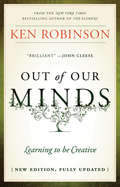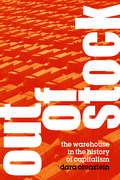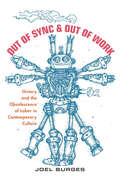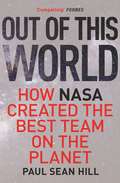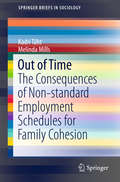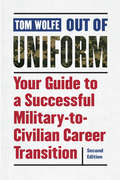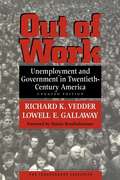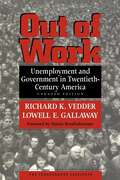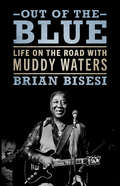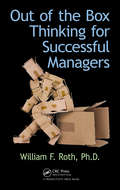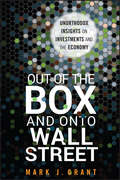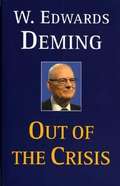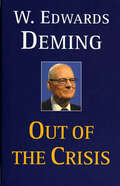- Table View
- List View
Out of Office: Ditch the 9-5 and Be Your Own Boss
by Fiona ThomasThe freelance industryis the fastest growing segment of the UK economy (seeing a 31% rise in 2019 and an anticipated rise of 50% in 2020), and people's desire for a work/life balance is at an all-time high. Out of Office offers a new possibility outside the 9-5 vacuum to become a successful and happy freelancer.Fiona's no-nonsense guide addresses the questions that people might feel too embarrassed to ask... like how to raise an invoice, register with HMRC, submit a tax return, claim expenses, network, and use social media. She also details why working from home is proven to have a positive impact on productivity and mental health, and why so many women are making the leap into freelancing out of necessity.Filled with with must-have information, helpful check-ins, and a strong focus on understanding the whys just as much as the hows, Out of Office will help you dive into freelance life and push you to the next level, while making sure you're taking time to reflect on your business and state of mind.
Out of Office: The Big Problem and Bigger Promise of Working from Home
by Anne Helen Petersen Charlie WarzelThe future isn&’t about where we will work, but how. For years we have struggled to balance work and life, with most of us feeling overwhelmed and burned out because our relationship to work is broken. This &“isn't just a book about remote work. It's a book that helps us imagine a future where our lives—at the office and home—are happier, more productive, and genuinely meaningful&” (Charles Duhigg, bestselling author of The Power of Habit).Out of Office is a book for every office worker – from employees to managers – currently facing the decision about whether, and how, to return to the office. The past two years have shown us that there may be a new path forward, one that doesn&’t involve hellish daily commutes and the demands of jam-packed work schedules that no longer make sense. But how can we realize that future in a way that benefits workers and companies alike? Based on groundbreaking reporting and interviews with workers and managers around the world, Out of Office illuminates the key values and questions that should be driving this conversation: trust, fairness, flexibility, inclusive workplaces, equity, and work-life balance. Above all, they argue that companies need to listen to their employees – and that this will promote, rather than impede, productivity and profitability. As a society, we have talked for decades about flexible work arrangements; this book makes clear that we are at an inflection point where this is actually possible for many employees and their companies. Out of Office is about so much more than zoom meetings and hybrid schedules: it aims to reshape our entire relationship to the office.
Out of Our Minds
by Ken Robinson"It is often said that education and training are the keys to the future. They are, but a key can be turned in two directions. Turn it one way andyou lock resources away, even from those they belong to. Turn it the otherway and you release resources and give people back to themselves. To realizeour true creative potential--in our organizations, in our schools and in our communities--we need to think differently about ourselves and to actdifferently towards each other. We must learn to be creative."--Ken RobinsonPRAISE FOR OUT OF OUR MINDS"Ken Robinson writes brilliantly about the different ways in which creativity is undervalued and ignored . . . especially in our educational systems."--John Cleese"Out of Our Minds explains why being creative in today'sworld is a vital necessity. This book is not to be missed."--Ken Blanchard, co-author of The One-minute Manager and The Secret"If ever there was a time when creativity was necessary for the survival andgrowth of any organization, it is now. This book, more than any other I know, providesimportant insights on how leaders can evoke and sustain those creative juices."--Warren Bennis, Distinguished Professor of Business, University of Southern California; Thomas S. Murphy Distinguished Rresearch Fellow, Harvard Business School; Best-selling Author, Geeks and Geezers"All corporate leaders should read this book."--Richard Scase, Author and Business Forecaster"This really is a remarkable book. It does for human resources what Rachel Carson's Silent Spring did for the environment."--Wally Olins, Founder, Wolff-olins"Books about creativity are not always creative. Ken Robinson's is a welcome exception"--Mihaly Csikszentmihalyi, c.s. and d.j. Davidson Professor of Psychology, Claremont Graduate University; Director, Quality of Life Research Center; Best-selling Author, Flow"The best analysis I've seen of the disjunction between the kinds of intelligence that we have traditionally honored in schools and the kinds ofcreativity that we need today in our organizations and our society."--Howard Gardner, a. hobbs professor in cognition and education, Harvard Graduate School of Education, Best-selling Author, Frames of Mind
Out of Our Minds: Learning to be Creative
by Ken RobinsonOut of Our Minds is about why creativity matters so much, why people think they are not creative, how we arrived at this point, and what we can do about it.
Out of Our Minds: The Power of Being Creative
by Ken RobinsonKen Robinson argues that organisations everywhere are trying to fix a problem that originates in schools and universities: "It is often said that education and training are the keys to the future. They are, but a key can be turned in two directions. Turn it one way and you lock resources away, even from those they belong to. Turn it the other way and you release resources and give people back to themselves. To realize our true creative potential¯in our organizations, in our schools and in our communities—we need to think differently about ourselves and to act differently towards each other. We must learn to be creative."—Ken Robinson The updated 3rd edition features a new introduction, modernized case studies, updated demographics and revised sections around technological developments and recent changes to the education system.
Out of Poverty
by Benjamin PowellThis book provides a comprehensive defense of third-world sweatshops. It explains how these sweatshops provide the best available opportunity to workers and how they play an important role in the process of development that eventually leads to better wages and working conditions. Using economic theory, the author argues that much of what the anti-sweatshop movement has agitated for would actually harm the very workers they intend to help by creating less desirable alternatives and undermining the process of development. Nowhere does this book put "profits" or "economic efficiency" above people. Improving the welfare of poorer citizens of third world countries is the goal, and the book explores which methods best achieve that goal. Out of Poverty will help readers understand how activists and policy makers can help third world workers.
Out of Poverty: Sweatshops in the Global Economy (Cambridge Studies in Economics, Choice, and Society)
by Benjamin PowellOut of Poverty provides a comprehensive defence of Third World sweatshops that does not put economic efficiency over people, but instead explores methods of improving the welfare of those in Third World countries. The author explains how sweatshops provide the best opportunity for workers; and how they play an important role in development, leading to better wages and working conditions. Using economic theory, empirical evidence, and historical investigation, Powell argues that the anti-sweatshop movement would harm the very workers it intends to help by creating less-desirable alternatives and undermining development. Including a new chapter on the 2013 Rana Plaza factory collapse in Bangladesh, this revised and expanded second edition also explores how sweatshop wages have changed and how poverty alleviation has progressed in countries with sweatshops in the late 1990s and early 2000s and how boycotting Uyghur forced labor in China differs other sweatshop boycotts.
Out of Poverty: What Works When Traditional Approaches Fail
by Paul PolakPolak explodes what he calls the "Three Great Poverty Eradication Myths": that we can donate people out of poverty, that national economic growth will end poverty, and that Big Business, operating as it does now, will end poverty.
Out of Poverty: What Works When Traditional Approaches Fail (Bk Currents Ser.)
by Paul PolakBased on his 25 years of experience, Polak explodes what he calls the "Three Great Poverty Eradication Myths": that we can donate people out of poverty, that national economic growth will end poverty, and that Big Business, operating as it does now, will end poverty. Polak shows that programs based on these ideas have utterly failed--in fact, in sub-Saharan Africa poverty rates have actually gone up. These failed top-down efforts contrast sharply with the grassroots approach Polak and IDE have championed: helping the dollar-a-day poor earn more money through their own efforts. Amazingly enough, unexploited market opportunities do exist for the desperately poor. Polak describes how he and others have identified these opportunities and have developed innovative, low-cost tools that have helped in lifting 17 million people out of poverty.
Out of Practice: Fighting for Primary Care Medicine in America (The Culture and Politics of Health Care Work)
by Frederick M. BarkenPrimary care medicine, as we know and remember it, is in crisis. While policymakers, government administrators, and the health insurance industry pay lip service to the personal relationship between physician and patient, dissatisfaction and disaffection run rampant among primary care doctors, and medical students steer clear in order to pursue more lucrative specialties. Patients feel helpless, well aware that they are losing a valued close connection as health care steadily becomes more transactional than relational. The thin-margin efficiency, rapid pace, and high volume demanded by the new health care economics do not work for primary care, an inherently slower, more personal, and uniquely tailored service. In Out of Practice, Dr. Frederick Barken juxtaposes his personal experience with the latest research on the transformations in the medical field. He offers a cool critique of the "market model of medicine" while vividly illustrating how the seemingly inexorable trend toward specialization in the last few decades has shifted emphasis away from what was once the foundation of medical practice. Dr. Barken addresses the complexities of modern practice—overuse of diagnostic studies, fragmentation of care, increasing reliance on an array of prescription drugs, and the practice of defensive medicine. He shows how changes in medicine, the family, and society have left physicians to deal with a wide range of geriatric issues, from limited mobility to dementia, that are not addressed by health care policy and are not entirely amenable to a physician’s prescription. Indeed, Dr. Barken contends, the very survival of primary care is in jeopardy at a time when its practitioners are needed more than ever. Illustrated with case studies gleaned from more than twenty years in private practice and data from a wide range of sources, Out of Practice is more than a jeremiad about a broken system. Throughout, Dr. Barken offers cogent suggestions for policymakers and practitioners alike, making clear that as valuable as the latest drug or medical device may be, a successful health care system depends just as much on the doctor-patient relationship embodied by primary care medicine.
Out of Sight: The Long and Disturbing Story of Corporations Outsourcing Catastrophe
by Erik LoomisA provocative analysis of labor, globalization, and environmental harm by the award-winning historian and author of A History of America in Ten Strikes. In the current state of our globalized economy, corporations have no incentive to protect their workers or the environment. Jobs moves seamlessly across national borders while the laws that protect us from rapacious behavior remain bound by them. As a result, labor exploitation and toxic pollution remain standard practice. In Out of Sight, Erik Loomis—a historian of both the labor and environmental movements—follows a narrative that runs from the 1911 Triangle Shirtwaist Factory fire in New York City to the collapse of the Rana Plaza factory outside of Dhaka, Bangladesh, in 2013. He demonstrates that our modern systems of industrial production are just as dirty and abusive as they were during the Industrial Revolution and the Gilded Age. The only difference is that the ugly side of manufacturing is now hidden in faraway places where workers are most vulnerable. In this Choice Outstanding Academic Title, Loomis shows that the great environmental victories of twentieth-century America—the Clean Water Act, the Clean Air Act, the EPA—were actually union victories. Using this history as a call to action, Out of Sight proposes a path toward regulations that follow corporations wherever they do business, putting the power back in workers&’ hands. &“The story told here is tragic and important.&” —Bill McKibben &“Erik Loomis prescribes how activists can take back our country—for workers and those who care about the health of our planet.&” —Senator Sherrod Brown (D-OH)
Out of Stock: The Warehouse in the History of Capitalism
by Dara OrensteinIn Out of Stock, Dara Orenstein delivers an ambitious and engrossing account of that most generic and underappreciated site in American commerce and industry: the warehouse. She traces the progression from the nineteenth century’s bonded warehouses to today’s foreign-trade zones, enclaves where goods can be simultaneously on US soil and off US customs territory. Orenstein contends that these zones—nearly 800 of which are scattered across the country—are emblematic of why warehouses have begun to supplant factories in the age of Amazon and Walmart. Circulation is so crucial to the logistics of how and where goods are made that it is increasingly inseparable from production, to the point that warehouses are now some of the most pivotal spaces of global capitalism. Drawing from cultural geography, cultural history, and political economy, Out of Stock nimbly demonstrates the centrality of warehouses for corporations, workers, cities, and empires.
Out of Sync & Out of Work: History and the Obsolescence of Labor in Contemporary Culture
by Joel BurgesOut of Sync & Out of Work explores the representation of obsolescence, particularly of labor, in film and literature during a historical moment in which automation has intensified in capitalist economies. Joel Burges analyzes texts such as The Invention of Hugo Cabret, Wreck-It Ralph, Fantastic Mr. Fox, and Iron Council, and examines their “means” of production. Those means include a range of subjects and narrative techniques, including the “residual means” of including classic film stills in a text, the “obstinate means” of depicting machine breaking, the “dated means” of employing the largely defunct technique of stop-motion animation, and the “obsolete” means of celebrating a labor strike. In every case, the novels and films that Burges scrutinizes call on these means to activate the reader’s/viewer’s awareness of historical time. Out of Sync & Out of Work advances its readers’ grasp of the complexities of historical time in contemporary culture, moving the study of temporality forward in film and media studies, literary studies, critical theory, and cultural critique.
Out of This World: The principles of high performance and perfect decision making learned from leading at NASA
by Paul Sean HillFailure is always an option...For more than 50 years, NASA's Mission Control has been known for two things: perfect decision making in extreme situations and producing generations of steely-eyed missile men and women who continue that tradition. A key to that legacy of brilliant performance is a particular brand of leadership, especially at the working level in Mission Control.Take the ultimate insiders look at the leadership values and culture that created the best team on this planet. Paul Sean Hill was responsible for NASA's Mission Operations support for manned space flight from 2007-2011. In this candid book he shows that the secret to Mission Control's success has never been rocket science and that the real practice of perfect decision making can be applied to any organisation or team. By demonstrating how his Mission Control team nurtured a culture which has delivered impossible wins for decades, Hill provides a guide for all leaders to boost their company's performance at all levels.Whether failure means cost and schedule overruns, quality reduction, loss of market share, bankruptcy - or putting someone's life a risk, how we lead can determine whether even small mistakes are dealt with or are left to snowball out of control and destroy an enterprise. Discover how to take leadership from the Mission Control Room to your boardroom and beyond, and achieve this out-of-this-world leadership environment in your team.
Out of Time
by Melinda Mills Kadri TähtThis pioneering work aims at understanding the impact of non-standard (evening, night, weekend) working time on family cohesion, meaning parent-child interaction, partnership quality and divorce or partnership dissolution. 'Out of time - the Consequences of Non-standard Employment Schedules for Family Cohesion' is the first work to treat this important topic in a cross-national, comparative way by using data from two large comparable surveys. The impact of work in non-standard schedules on workers can be divided into individual and social consequences. Research so far has shown the clear individual effects of these schedules, such as increased stress levels and sleeping and physical disorders. There is less clarity about social consequences. Either no or positive effects of these types of schedules on workers and their families are found, or a significant negative impact on the relations between the workers and others, especially other members of the family is shown in research results. This Brief compares the Netherlands and the United States of America, countries that both show a high prevalence of non-standard schedule work, whereas both operate in very different institutional and welfare regime settings of working time regulation. By combining both quantitative and qualitative data, the authors are able to provide generalized views of comparative surveys and challenging those generalizations at the same time, thus enabling the reader to get a better understanding and more balanced view of the actual relationship between non-standard employment schedules and family cohesion.
Out of Uniform: Your Guide to a Successful Military-to-Civilian Career Transition (Second Edition)
by Tom WolfeAfter completing military service, veterans can have a difficult time finding employment when returning to civilian life. <p><p>Out of Uniform, Second Edition is designed to help all transitioning military personnel, regardless of service, branch, rank, rating, time in service, time in grade, or specialty. Although all service members share common denominators, each individual brings something unique to the job market. Not only does this book cover the basics—search techniques, networking, interview preparation, résumés, negotiation, and a new chapter on social media—it also offers guidance on topics that are often overlooked, specifically the central issues of self-knowledge, interviewing empathy, and the power of questions. <p>In addition to the technical guidance, readers will also discover important information in the anecdotes based on the experiences of soldiers, sailors, air force personnel, and marines. Out of Uniform, Second Edition is an invaluable resource for veterans who want to make the most out of their civilian career opportunities.
Out of Work: Unemployment and Government in Twentieth-Century America
by Richard K Vedder Lowell E. GallawayRedefining the way we think about unemployment in America today, Out of Work offers devastating evidence that the major cause of high unemployment in the United States is the government itself. An Independent Institute Book
Out of Work: Unemployment and Government in Twentieth-Century America
by Richard K Vedder Lowell E. GallawayArgues the cause of unemployment may be the government itselfRedefining the way we think about unemployment in America today, Out of Work offers devastating evidence that the major cause of high unemployment in the United States is the government itself.
Out of the Blue: Life on the Road with Muddy Waters (American Made Music Series)
by Brian BisesiOut of the Blue: Life on the Road with Muddy Waters begins with a moment lifted from a young musician’s dreams. Brian Bisesi, a guitarist barely out of his teens, is invited on stage to fill in for a missing member of the band backing blues legend Muddy Waters. This life-changing quirk of fate opens the door into a world of challenges and opportunities that Bisesi, an Italian American reared in the comforts of a New York City suburb, can barely imagine. Despite their differences, Bisesi and Waters hit it off, and what might have been a one-night stand turns into a career. From 1978 to 1980, Bisesi works for Waters as his road manager, bean-counter, and at times his confidant, while often sitting in with the band. Bisesi’s years with the band take him to Europe, Japan, Canada, and across the United States as Waters tours—and parties—with rock gods like Eric Clapton, the Rolling Stones, a Beatle, and the gamut of musicians who came of age with Waters and introduced a younger generation to the blues. In Out of the Blue, Bisesi captures it all: from the pranks and tensions among bluesmen enduring a hard life on the road, to observations about Waters’s technique, his love of champagne and reefer, his eye for women, and his sometimes-acrid views of contemporary music. Bisesi has sharp insights into the ill-conceived management decisions that led to the dissolution of Waters’s longest-serving band in June of 1980. This book will rivet, amuse, and occasionally infuriate blues aficionados. It is a raucous and intimate portrait of the blues scene at a pivotal moment in time that fascinates music historians and blues fans alike.
Out of the Box Thinking for Successful Managers
by William F. RothDuring the author‘s decades of experience consulting in the corporate world and teaching management theory at the university level, he has often questioned many modern-day management practices. For example, why do so many companies have evaluation and reward systems that force employees to compete against each other while these same organizations p
Out of the Box Thoughts about the International Financial Architecture
by Barry EichengreenA report from the International Monetary Fund.
Out of the Box and Onto Wall Street
by Mark J. GrantA guide to thinking outside the Wall Street box Part memoir, part investment strategy guide, Out of the Box and onto Wall Street presents a revolutionary, alternative look at the world of finance. Revealing the essential rules for preserving capital and making long-term profits, the book provides timely observations on the current and future state of the world economy and investment markets, which are sure to be of interest to anyone considering alternative and time proven ways of making money. Written by Mark J. Grant, Managing Director of Corporate Syndicate and Structured Products for Southwest Securities, Inc Provides observations on the current and future state of the world economy and investment markets Offers detailed analysis of investment trends, common investor mistakes, and the simple investment strategies that most people are unaware of Designed for professional managers but also applicable for use by individual investors wanting a better understanding of the economy and how to pick smart investments for their own portfolio This is a must-read for anyone who wants to think about investing outside the Wall Street box.
Out of the Breakdown Gap: Strategy and Tactics--Preparing Yourself for the Inevitable Breakdowns in Communication that Occur During Difficult Conversations
by Holly WeeksIt is the nature of two-level, tough conversations-with communication up top where it's observable, and interpretations with all its flaws concealed below-that we won't see breakdowns in understanding coming. To stop the slide into this breakdown gap, we want a good, balanced strategy that is flexible enough to allow for differences between intentions and perceptions on both sides. This chapter outlines two strategies that will give you the raw material you need to go into a hard talk with a counterpart who is unlikely to see the situation the way you do.
Out of the Crisis
by W. Edwards Deming"Long-term commitment to new learning and new philosophy is required of any management that seeks transformation. The timid and the fainthearted, and the people that expect quick results, are doomed to disappointment. "According to W. Edwards Deming, American companies require nothing less than a transformation of management style and of governmental relations with industry. In Out of the Crisis, originally published in 1982, Deming offers a theory of management based on his famous 14 Points for Management. Management's failure to plan for the future, he claims, brings about loss of market, which brings about loss of jobs. Management must be judged not only by the quarterly dividend, but by innovative plans to stay in business, protect investment, ensure future dividends, and provide more jobs through improved product and service. In simple, direct language, he explains the principles of management transformation and how to apply them. previously published by MIT-CAES
Out of the Crisis
by W. Edwards DemingDeming offers a theory of management based on his famous 14 Points for Management. "Long-term commitment to new learning and new philosophy is required of any management that seeks transformation. The timid and the fainthearted, and the people that expect quick results, are doomed to disappointment."According to W. Edwards Deming, American companies require nothing less than a transformation of management style and of governmental relations with industry. In Out of the Crisis, originally published in 1982, Deming offers a theory of management based on his famous 14 Points for Management. Management's failure to plan for the future, he claims, brings about loss of market, which brings about loss of jobs. Management must be judged not only by the quarterly dividend, but by innovative plans to stay in business, protect investment, ensure future dividends, and provide more jobs through improved product and service. In simple, direct language, he explains the principles of management transformation and how to apply them.Previously published by MIT-CAES
